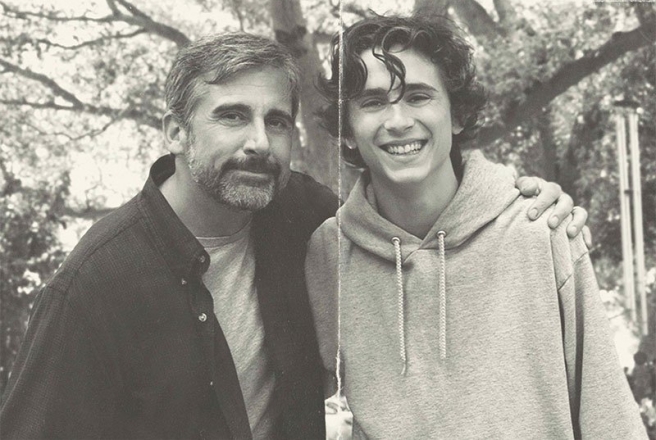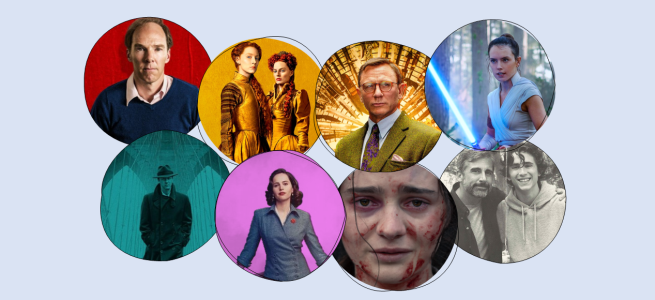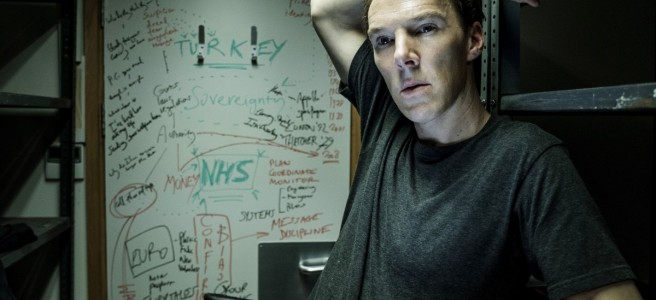Films!
So, I watched twenty-six films this year, according to my Letterboxd. This isn’t so much a list of the best films of 2019 – I have very little doubt that, whatever that film was, I didn’t get around to actually watching it – but rather just a ranking of the various 2019 releases I saw this go around. Which, admittedly, wasn’t very many; after all, television has always been and still remains my first love, a lot moreso than cinema. (Not that I actually watched a lot of television this year either, I suppose, but still.) As ever, I’m going to try and be a bit more on top of things across 2020 – I’m already planning on working my way through some of the more recent Netflix releases, like Marriage Story and The Irishman, in January – but I suppose I say that every year.
First of all, a quick reminder of my favourites of 2018 and 2017. I didn’t really put together proper lists – largely because I watched even fewer films then; or, at least, didn’t take track quite as well – but in 2017 my favourite films were Miss Sloane, Bar Bahar/In Between, and Star Wars: The Last Jedi, and in 2018 my favourites were Lady Bird, The Miseducation of Cameron Post, and Brooklyn. Also quite enjoyed Into the Spiderverse and A Star is Born, too.
A fair few of those twenty-six films were films I’d seen before, or films that didn’t come out in 2019, so I’ve left them off the list. Of the non-2019 releases, probably A Clockwork Orange is most noteworthy; hard to say I enjoyed it as such, but I’m glad to have finally got around to it in the end anyway.
Anyway. Films!
15) Star Wars: The Rise of Skywalker
Not the worst film I saw all year exactly, but certainly the most aggravating, and the one I think I resent the most. Everything else had something to say, even when I was inclined to be critical of what the film was saying; this was an anodyne, empty film, written by committee and making concessions to entirely awful people. Worse still, it’s hard not to get the sense that the long arc of history is bending towards cinema like this. Very, very dispiriting.
What I wrote about it: A full review, just a few days ago, which you can find here.
14) Green Book
Extremely yikes! This really only nominally counts because of the vagaries of UK release dates – should’ve left it in 2018, really – but I went to see this a few weeks after it won the Oscar. Probably one of the more uncomfortable cinema experiences of the year, that: lot of the audience really, really enjoyed it. There was a group a few rows behind me properly just cackling away.
13) Beautiful Boy

Ultimately quite a hollow film, with very little going on beneath the surface; I’m not actually particularly convinced either Steve Carrell or Timmy give especially impressive performances either. Mawkish and manipulative.
What I wrote about it: Probably one of the best interviews I’ve ever done, this – a conversation with the writer, Luke Davies, about the female characters in the film, his own history of addiction, and more.
11) Five Feet Apart / Tall Girl
These basically occupied the same sort of space, so I’m inclined to put them together (although I suppose if I were being honest with myself, I should probably admit I enjoyed Tall Girl a lot more than some of the other films I ranked higher on the list). Absolutely trash, both of them, but enjoyably so.
10) Judy
As the credits started to roll, my friend turned around and said “so, was that Judi Dench?”
I enjoyed that more than the actual film, to be honest.
9) Last Christmas

Why must a movie be “good”? Isn’t it enough to sit somewhere dark and see Emilia Clarke’s eyebrows, huge?
8) Brexit: The Uncivil War
It’s a testament to quite how long this god-awful year has been to realise that I watched this nonsense in 2019. Twelve months on, with a new prime minister in place, and Brexit finally about to “get done” – ha ha ha ha – it’s hard to imagine this has aged particularly well. You’ve gotta hope, on some level at least, that James Graham and Benedict Cumberbatch regret it, at least a little bit.
What I wrote about it: Here’s my review of the film, which is quite critical. I did not especially like this film.
7) On the Basis of Sex
It’s an obviously fairly derivative biopic; in more ways than one it’s quite a small-c-conservative film, and there’s just generally something quite uncomfortable about that particular strain of American liberalism and the way it’s created this hagiography of an actually very fallible woman deserving of much more criticism than she got here.
That said, though: it’s still basically an entertaining way to spend a few hours. Armie Hammer is pretty good, and I always have a lot of time for Felicity Jones. Plus, someone unironically said “no way José”, which I very much enjoyed.
6) Captain Marvel
The usual Marvel stuff, this time starring Brie Larson… but I quite like Brie Larson, so this was good fun. At time of writing, I actually haven’t see Avengers: Endgame yet – I know, I know, but I was busy that week – but I figure it’ll end up basically in this slot.
5) Mary Queen of Scots

It doesn’t really reinvent the wheel or anything, but there’s a lot of interesting little choices across the film that make it engaging enough. I’d have liked to interview the director Josie Rourke, actually. I imagine that would’ve made for quite an interesting conversation.
4) The Nightingale
Quite an uncomfortable watch, this – albeit obviously deliberately so, and it wouldn’t work anywhere near as well as it does if it didn’t make you uncomfortable. Not a film I like, not exactly – and, in fact, when I first watched it I actually quite disliked it – but the more I think on it, the more impressed by it I am. I suspect of all the films I watched this year, The Nightingale is the one I’ll find myself thinking about longest.
What I wrote about it: I reviewed this film for Flickering Myth, and you can find that piece here. I also interviewed stars Aisling Francoisi and Sam Claflin about the film, which was very exciting, and you can find that here.
3) The Two Popes
I liked this a lot – quite a lot more, I think, than most other people did. Not a lot more to add beyond what I’ve already said, though. I would recommend it! It’s worth a watch, I reckon.
What I wrote about it: I reviewed this film for Flickering Myth too, and you can find that piece here.
2) Knives Out
Such a well-crafted film, made all the more enjoyable by the sheer amount of fun all involved are so clearly having. Hopefully, Rian Johnson will make quite a few more of these in the years to come – a new Benoit Blanc mystery every couple of Christmasses would be a nice new tradition to develop.
1) Motherless Brooklyn

My favourite of the year. It’s a shame that this doesn’t seem to have found much of an audience, though it was probably the wrong time of year to release it anyway; I suppose it was probably meant to act as an alternative to some of the bigger movies of the month, but evidently that didn’t work out. A shame, that. I think this’ll probably have a new life on Netflix or something similar in a few years’ time – it’s quite a good film, and really deserves some sort of an audience.
What I wrote about it: I reviewed this one for Flickering Myth, and you can find that here. As well as that! I also interviewed Edward Norton and Gugu Mbatha-Raw about the film, which was very exciting.
So! That’s another year done. What I am extremely conscious of is quite how narrow this set of films is, definitely that’s something I need to get better at. Granted I’m a bit limited by what actually plays at my local cinema, but still, something to try and work on. Think I might try and go to LFF in 2020, actually. That’d probably be a good thing.
What am I looking forward to next year? Heard a lot of good things about Clemency, although god knows when that’ll pick up a UK release date. Artemis Fowl I’m actually kinda cautiously curious about, if only because I used to really love the books. Little Women, too, I’m looking forward to, although I suppose really that’s a 2019 release I just won’t get around to until next year. Not unlike a lot of the films I’ll end up watching in 2020, I suspect.
Related:
Facebook | Twitter | Blog Index | Film Index


